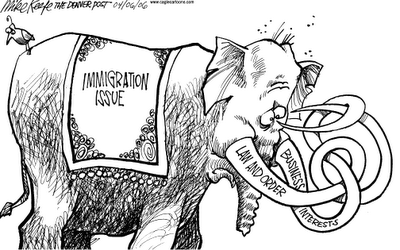 THE ruling by a Somali court to deport more than 20 Kenyans found to be in the country illegally is the latest episode in a series of events that highlight the tensions threatening to inflame conflict between the neighbouring countries.
THE ruling by a Somali court to deport more than 20 Kenyans found to be in the country illegally is the latest episode in a series of events that highlight the tensions threatening to inflame conflict between the neighbouring countries.
Last week, Judge Hashi Elmi Noor ordered the deportation of the 27 Kenyans, the first time in 25 years that Somalia has expelled foreigners for overstaying their visas.
The men have also been fined $10 (about R13,70) for each day they were in the country illegally.
While the two governments have not gone public about the decision and amid the insistence by some sections of the media reporting this was a genuine exercise to ensure foreign nationals were properly-documented, analysts believe the deportation might be in response to the alleged violations Somalis have suffered in Kenya at the height of the Al Shabaab terror that has claimed scores in Kenya.
Ironically, the Islamic militant Al Shabaab has in recent years been carrying out terror attacks in Kenya in protest of the presence of the East African country’s military presence in Somalia, the insurgency-afflicted country in the Horn of Africa.
In reaction, the Kenyan government has been rounding up some Somali refugees accusing them of links to the Al Shabaab.
In one such incident that drew international attention, last year some 400 Somalis were rounded up and sent to Mogadishu from the Nairobi district of Eastleigh, which is home to many ethnic Somalis.
Kenya has previously threatened to start mass deportations from refugee camps in the country but has bowed to international pressure.
Dabbab, the world’s biggest refugee camp with some 350 000 displaced persons, mostly Somali, is according to the government, a hotbed for jihadist Al Shabaab militants, and a staging post for terrorist attacks on Kenya.
“The recent decision to deport the Kenyans said to be illegally living in Somali might be justifiable but there is more to it than meets the eye.
“It is suspicious and coinciding with long running violations of rights of Somalia refugees in Kenya, can only suggest a motive of retribution by the Somali court,” said sociopolitical commentator, Anasi Obara.
Meanwhile, while progress has been slow, Kenya earlier this year announced plans to build a barrier along its porous border with Somalia to keep out Al Shabaab militants.
The 700-kilometre wall is a series of concrete barriers, ditches, fences, and closed circuit television-monitored observation stations.
The barricade is expected to stretch from the Indian Ocean to the city of Mandera.
This is where both countries converge with Ethiopia.
In the meantime, the greater recipe for conflict is the maritime border dispute between the two countries.
Earlier this year, Somalia filed a case against Kenya at the International Court of Justice in The Hague over the dispute.
The Court is expected to give its final ruling on the dispute by 2017.
Both Somalia and Kenya are claiming the patch of about 1 000 km that is said to be rich in natural resources such as gas, oil and fish.
The dispute arose in 2009 and has been the talking point since then.
The desire to licence oil/mineral prospecting firms and the revenue that will come with the potential discoveries is the source of the dispute.
In 2009, Kenya and Somalia signed a memorandum of understanding that the border would run east along the line of latitude, but Somalia, which has lacked an effective central government since 1991, then rejected the agreement in parliament.
Abdi Sh-Ali Ahmed, a public policy and international development analyst, offered an insight into the relations between the two countries.
He said in contrast to what Kenyan had been publicly asserting, Kenya had collectively mistreated and punished all Somalis in Kenya, regardless of whether they are Kenyan citizens or not.
The expert said the relationship between Somalia and Kenya could be defined by what has been happening to Somali nationals in Kenya in recent years.
“The two countries have different political systems and structural framework values. Through its poor leadership, individualistic policies, and collective punishment for anyone of Somali ethnic background, including Somali Kenyans, Kenya has miscalculated the results of its policies and has created a dangerous situation for its peoples.”
Sh-Ali Ahmed is wary of the tensions boiling over.
“Both Somalia and Kenya are heading in the wrong direction under their current leaderships.
“Somalia is already a troubled and failed state, but Kenyan citizens need to reassess the situation and think strategically about their government’s policy toward Somalia before it is too late and the situation reaches an irreversible state,” Obara said.
![]()





























